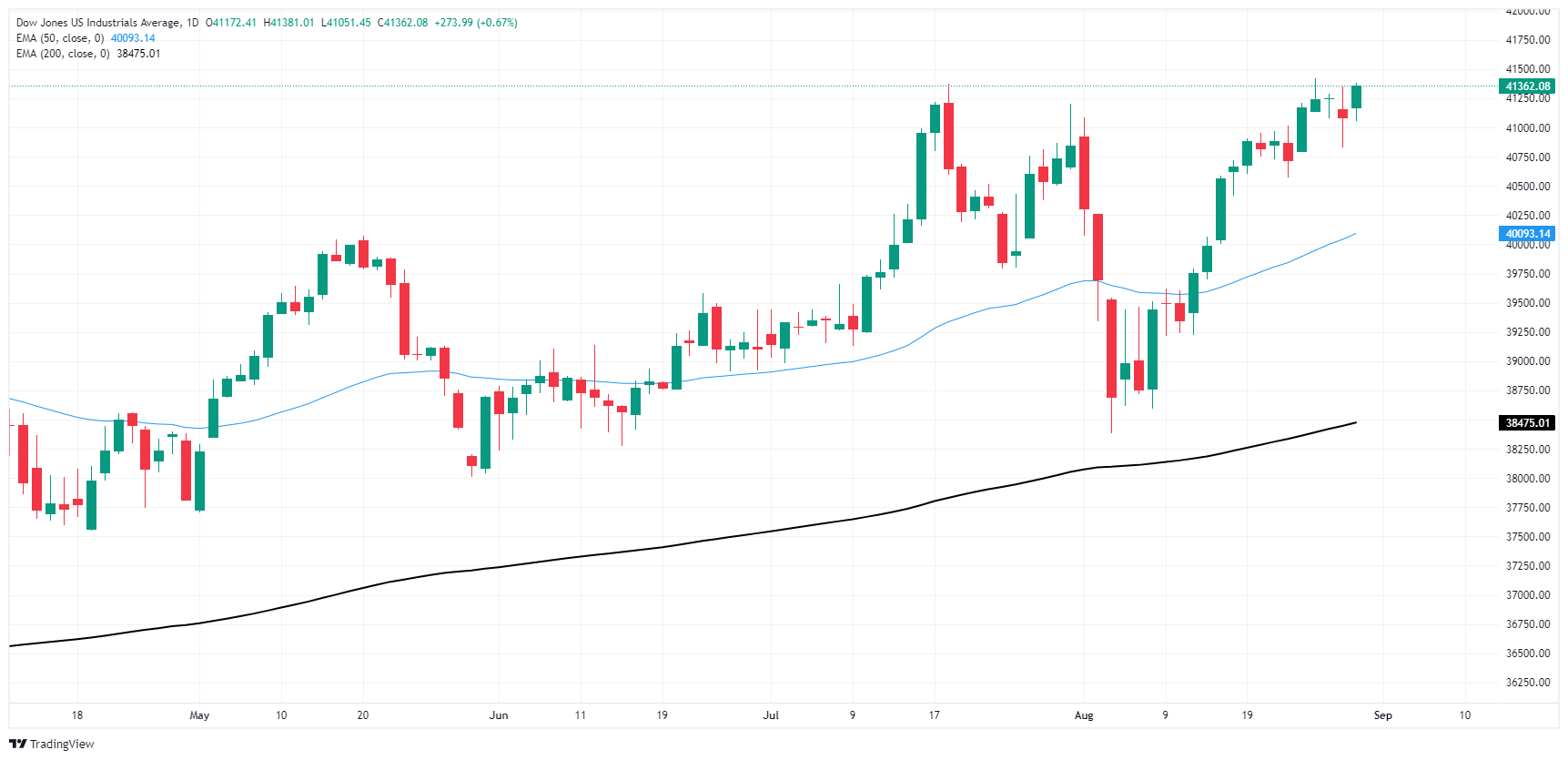Dow Jones Industrial Average churns on Thursday but finds some gains
- The Dow Jones rose 450 points on Thursday as sentiment recovered.
- US GDP figures bolstered investor confidence after printing above expectations.
- US PCE inflation numbers still loom ahead on Friday.
The Dow Jones Industrial Average (DJIA) rose 1.1%, or 450 points, on Thursday, buoyed by a forecast beat in US Gross Domestic Product (GDP) growth numbers in Q2. US Personal Consumption Expenditure Price Index (PCE) inflation data, due on Friday, is still the key print of the week. Markets remain confident that the Federal Reserve (Fed) is on pace to kick off a rate-cutting cycle in September. An afternoon pullback in the equity space dragged the Dow Jones lower, squeezing the day's gains to around 200 points.
US Q2 GDP beat forecasts Thursday morning, propping up market sentiment and sending investors back into a bidding stance. Annualized Q2 GDP came in at 3.0% compared to the expected hold at 2.8%, and Initial Jobless Claims also ticked down to 231K for the week ended August 23. Investors had expected a print of 232K compared to the previous week’s revised 233K.
US core PCE inflation on Friday is expected to hold steady MoM and drift slightly higher on an annualized basis. July’s MoM core PCE inflation is forecast to hold at 0.2%, while the YoY figure for July is expected to tick up to 2.7% from the previous 2.6%. A below-expectations print will send markets piling back into hopes for an extended initial cut from the Fed on September 18, while an above-forecast release could send traders scurrying in the face of a potential resurgence in inflation, hobbling the Fed just before a widely-expected cut.
Dow Jones news
A risk-on Thursday has most of the Dow Jones index trading into the green in the back half of the trading week. Only three of the Dow’s listed securities are in the red for the day, with Home Depot (HD) shedding around seven-tenths of one percent to trade below $370.00 per share.
Nvidia’s (NVDA) after-hours earnings call this week failed to jump-start tech-keen investors. Nvidia reported less-than-expected growth in earnings, with an overall uptick in profit failing to meet sky-high expectations set by runaway investors.
Dow Jones price forecast
The Dow Jones is back over 41,300 on Thursday after a brief midweek dip below the 41,000 handle. The index took a breather on Wednesday, but it has tilted back into the bullish side as daily candles continue to test chart paper near record highs set at the beginning of the trading week.
Traders hoping to capitalize on a bearish pullback run the risk of underestimating bullish market pressure, but risk-takers will be looking for signs of a technical breakdown to jump on the short train. Immediate technical targets are floating near the 50-day Exponential Moving Average (EMA) just above the 40,000 major price handle.
Dow Jones daily chart
Economic Indicator
Core Personal Consumption Expenditures - Price Index (YoY)
The Core Personal Consumption Expenditures (PCE), released by the US Bureau of Economic Analysis on a monthly basis, measures the changes in the prices of goods and services purchased by consumers in the United States (US). The PCE Price Index is also the Federal Reserve’s (Fed) preferred gauge of inflation. The YoY reading compares the prices of goods in the reference month to the same month a year earlier. The core reading excludes the so-called more volatile food and energy components to give a more accurate measurement of price pressures." Generally, a high reading is bullish for the US Dollar (USD), while a low reading is bearish.
Read more.Next release: Fri Aug 30, 2024 12:30
Frequency: Monthly
Consensus: 2.7%
Previous: 2.6%
Source: US Bureau of Economic Analysis
After publishing the GDP report, the US Bureau of Economic Analysis releases the Personal Consumption Expenditures (PCE) Price Index data alongside the monthly changes in Personal Spending and Personal Income. FOMC policymakers use the annual Core PCE Price Index, which excludes volatile food and energy prices, as their primary gauge of inflation. A stronger-than-expected reading could help the USD outperform its rivals as it would hint at a possible hawkish shift in the Fed’s forward guidance and vice versa.